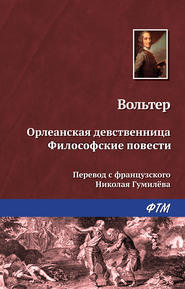По всем вопросам обращайтесь на: info@litportal.ru
(©) 2003-2024.
✖
A Philosophical Dictionary, Volume 09
Настройки чтения
Размер шрифта
Высота строк
Поля
"But thou, Bethlehem Ephratah, though thou be little among the thousands of Judah, yet out of thee shall come forth a ruler in Israel; whose goings forth have been from of old, from everlasting."
They dare to deny that this prophecy applies to Jesus Christ. They say that it is evident that Micah speaks of some native captain of Bethlehem, who shall gain some advantage in the war against the Babylonians: for the moment after he speaks of the history of Babylon, and of the seven captains who elected Darius. And if we demonstrate that he treated of the Messiah, they still will not agree.
The Jews are grossly deceived in Judah, who should be a lion, and who has only been an ass under the Persians, Alexander, the Seleucides, Ptolemys, Romans, Arabs, and Turks.
They know not what is understood by the Shiloh, and by the rod, and the thigh of Judah. The rod has been in Judæa but a very short time. They say miserable things; but the Abbé Houteville says not much more with his phrases, his neologism, and oratorical eloquence; a writer who always puts words in the place of things, and who proposes very difficult objections merely to reply to them by frothy discourse, or idle words!
All this is, therefore, labor in vain; and when the French abbé would make a still larger book, when he would add to the five or six thousand volumes which we have on the subject, we shall only be more fatigued, without advancing a single step.
We are, therefore, plunged in a chaos which it is impossible for the weakness of the human mind to set in order. Once more, we have need of a church which judges without appeal. For in fact, if a Chinese, a Tartar, or an African, reduced to the misfortune of having only good sense, read all these prophecies, it would be impossible for him to apply them to Jesus Christ, the Jews, or to anyone else. He would be in astonishment and uncertainty, would conceive nothing, and would not have a single distinct idea. He could not take a step in this abyss without a guide. With this guide, he arrives not only at the sanctuary of virtue, but at good canon-ships, at large commanderies, opulent abbeys, the crosiered and mitred abbots of which are called monseigneur by his monks and peasants, and to bishoprics which give the title of prince. In a word, he enjoys earth, and is sure of possessing heaven.
PROPHETS
The prophet Jurieu was hissed; the prophets of the Cévennes were hanged or racked; the prophets who went from Languedoc and Dauphiny to London were put in the pillory; the Anabaptist prophets were condemned to various modes and degrees of punishment; and the prophet Savonarola was baked at Florence. If, in connection with these, we may advert to the case of the genuine Jewish prophets, we shall perceive their destiny to have been no less unfortunate; the greatest prophet among the Jews, St. John the Baptist, was beheaded.
Zachariah is stated to have been assassinated; but, happily, this is not absolutely proved. The prophet Jeddo, or Addo, who was sent to Bethel under the injunction neither to eat nor drink, having unfortunately tasted a morsel of bread, was devoured in his turn by a lion; and his bones were found on the highway between the lion and his ass. Jonah was swallowed by a fish. He did not, it is true, remain in the fish's stomach more than three days and three nights; even this, however, was passing threescore and twelve hours very uncomfortably.
Habakkuk was transported through the air, suspended by the hair of his head, to Babylon; this was not a fatal or permanent calamity, certainly; but it must have been an exceedingly uncomfortable method of travelling. A man could not help suffering a great deal by being suspended by his hair during a journey of three hundred miles. I certainly should have preferred a pair of wings, or the mare Borak, or the Hippogriffe.
Micaiah, the son of Imla, saw the Lord seated on His throne, surrounded by His army of celestial spirits; and the Lord having inquired who could be found to go and deceive King Ahab, a demon volunteered for that purpose, and was accordingly charged with the commission; and Micaiah, on the part of the Lord, gave King Ahab an account of this celestial adventure. He was rewarded for this communication by a tremendous blow on his face from the hand of the prophet Zedekiah, and by being shut up for some days in a dungeon. His punishment might undoubtedly have been more severe; but still, it is unpleasant and painful enough for a man who knows and feels himself divinely inspired to be knocked about in so coarse and vulgar a manner, and confined in a damp and dirty hole of a prison.
It is believed that King Amaziah had the teeth of the prophet Amos pulled out to prevent him from speaking; not that a person without teeth is absolutely incapable of speaking, as we see many toothless old ladies as loquacious and chattering as ever; but a prophecy should be uttered with great distinctness; and a toothless prophet is never listened to with the respect due to his character.
Baruch experienced various persecutions. Ezekiel was stoned by the companions of his slavery. It is not ascertained whether Jeremiah was stoned or sawed asunder. Isaiah is considered as having been incontestably sawed to death by order of Manasseh, king of Judah.
It cannot be denied, that the occupation of a prophet is exceedingly irksome and dangerous. For one who, like Elijah, sets off on his tour among the planets in a chariot of light, drawn by four white horses, there are a hundred who travel on foot, and are obliged to beg their subsistence from door to door. They may be compared to Homer, who, we are told, was reduced to be a mendicant in the same seven cities which afterwards sharply disputed with each other the honor of having given him birth. His commentators have attributed to him an infinity of allegories which he never even thought of; and prophets have frequently had the like honor conferred upon them. I by no means deny that there may have existed elsewhere persons possessed of a knowledge of the future. It is only requisite for a man to work up his soul to a high state of excitation, according to the doctrine of one of our doughty modern philosophers, who speculates upon boring the earth through to the Antipodes, and curing the sick by covering them all over with pitch-plaster.
The Jews possessed this faculty of exalting and exciting the soul to such a degree that they saw every future event as clearly as possible; only unfortunately, it is difficult to decide whether by Jerusalem they always mean eternal life; whether Babylon means London or Paris; whether, when they speak of a grand dinner, they really mean a fast, and whether red wine means blood, and a red mantle faith, and a white mantle charity. Indeed, the correct and complete understanding of the prophets is the most arduous attainment of the human mind.
There is likewise a further difficulty with respect to the Jewish prophets, which is, that many among them were Samaritan heretics. Hosea was of the tribe of Issachar, which dwelt in the Samaritan territory, and Elisha and Elijah were of the same tribe. But the objection is very easily answered. We well know that "the wind bloweth where it listeth," and that grace lights on the most dry and barren, as well as on the most fertile soil.
PROVIDENCE
I was at the grate of the convent when Sister Fessue said to Sister Confite: "Providence takes a visible care of me; you know how I love my sparrow; he would have been dead if I had not said nine ave-marias to obtain his cure. God has restored my sparrow to life; thanks to the Holy Virgin."
A metaphysician said to her: "Sister, there is nothing so good as ave-marias, especially when a girl pronounces them in Latin in the suburbs of Paris; but I cannot believe that God has occupied Himself so much with your sparrow, pretty as he is; I pray you to believe that He has other matters to attend to. It is necessary for Him constantly to superintend the course of sixteen planets and the rising of Saturn, in the centre of which He has placed the sun, which is as large as a million of our globes. He has also thousands and thousands of millions of other suns, planets, and comets to govern. His immutable laws, and His eternal arrangement, produce motion throughout nature; all is bound to His throne by an infinite chain, of which no link can ever be put out of place!" If certain ave-marias had caused the sparrow of Sister Fessue to live an instant longer than it would naturally have lived, it would have violated all the laws imposed from eternity by the Great Being; it would have deranged the universe; a new world, a new God, and a new order of existence would have been rendered unavoidable.
SISTER FESSUE. – What! do you think that God pays so little attention to Sister Fessue?
METAPHYSICIAN. – I am sorry to inform you, that like myself you are but an imperceptible link in the great chain; that your organs, those of your sparrow, and my own, are destined to subsist a determinate number of minutes in the suburbs of Paris.
SISTER FESSUE. – If so, I was predestined to say a certain number of ave-marias.
METAPHYSICIAN. – Yes; but they have not obliged the Deity to prolong the life of your sparrow beyond his term. It has been so ordered, that in this convent at a certain hour you should pronounce, like a parrot, certain words in a certain language which you do not understand; that this bird, produced like yourself by the irresistible action of general laws, having been sick, should get better; that you should imagine that you had cured it, and that we should hold together this conversation.
SISTER FESSUE. – Sir, this discourse savors of heresy. My confessor, the reverend Father de Menou, will infer that you do not believe in Providence.
METAPHYSICIAN. – I believe in a general Providence, dear sister, which has laid down from all eternity the law which governs all things, like light from the sun; but I believe not that a particular Providence changes the economy of the world for your sparrow or your cat.
SISTER FESSUE. – But suppose my confessor tells you, as he has told me, that God changes His intentions every day in favor of the devout?
METAPHYSICIAN. – He would assert the greatest absurdity that a confessor of girls could possibly utter to a being who thinks.
SISTER FESSUE. – My confessor absurd! Holy Virgin Mary!
METAPHYSICIAN. – I do not go so far as that. I only observe that he cannot, by an enormously absurd assertion, justify the false principles which he has instilled into you – possibly very adroitly – in order to govern you.
SISTER FESSUE. – That observation merits reflection. I will think of it.
PURGATORY
It is very singular that the Protestant churches agree in exclaiming that purgatory was invented by the monks. It is true that they invented the art of drawing money from the living by praying to God for the dead; but purgatory existed before the monks.
It was Pope John XIV., say they, who, towards the middle of the tenth century, instituted the feast of the dead. From that fact, however, I only conclude that they were prayed for before; for if they then took measures to pray for all, it is reasonable to believe that they had previously prayed for some of them; in the same way as the feast of All Saints was instituted, because the feast of many of them had been previously celebrated. The difference between the feast of All Saints and that of the dead, is, that in the first we invoke, and that in the second we are invoked; in the former we commend ourselves to the blessed, and in the second the unblessed commend themselves to us.
The most ignorant writers know, that this feast was first instituted at Cluny, which was then a territory belonging to the German Empire. Is it necessary to repeat, "that St. Odilon, abbot of Cluny, was accustomed to deliver many souls from purgatory by his masses and his prayers; and that one day a knight or a monk, returning from the holy land, was cast by a tempest, on a small island, where he met with a hermit, who said to him, that in that island existed enormous caverns of fire and flames, in which the wicked were tormented; and that he often heard the devils complain of the Abbot Odilon and his monks, who every day delivered some soul or other; for which reason it was necessary to request Odilon to continue his exertions, at once to increase the joy of the saints in heaven and the grief of the demons in hell?"
It is thus that Father Gerard, the Jesuit, relates the affair in his "Flower of the Saints," after Father Ribadeneira. Fleury differs a little from this legend, but has substantively preserved it. This revelation induced St. Odilon to institute in Cluny the feast of the dead, which was then adopted by the Church.
Since this time, purgatory has brought much money to those who possess the power of opening the gates. It was by virtue of this power that English John, that great landlord, surnamed Lackland, by declaring himself the liegeman of Pope Innocent III., and placing his kingdom under submission, delivered the souls of his parents, who had been excommunicated: "Pro mortuo excommunico, pro quo supplicant consanguinei."
The Roman chancery had even its regular scale for the absolution of the dead; there were many privileged altars in the fifteenth century, at which every mass performed for six liards delivered a soul from purgatory. Heretics could not ascend beyond the truth, that the apostles had the right of unbinding all who were bound on earth, but not under the earth; and many of them, like impious persons, doubted the power of the keys. It is however to be remarked, that when the pope is inclined to remit five or six hundred years of purgatory, he accords the grace with full power: "Pro potestate a Deo accepta concedit."
Of the Antiquity of Purgatory.
It is pretended that purgatory was, from time immemorial, known to the famous Jewish people, and it is founded on the second book of the Maccabees, which says expressly, "that there being found concealed in the vestments of the Jews (at the battle of Adullam), things consecrated to the idols of Jamma, it was manifest that on that account they had perished; and having made a gathering of twelve thousand drachms of silver, Judas, who thought religiously of the resurrection, sent them to Jerusalem for the sins of the dead."
Having taken upon ourselves the task of relating the objections of the heretics and infidels, for the purpose of confounding them by their own opinions, we will detail here these objections to the twelve thousand drachms transmitted by Judas; and to purgatory. They say: 1. That twelve thousand drachms of silver was too much for Judas Maccabeus, who only maintained a petty war of insurgency against a great king.
2. That they might send a present to Jerusalem for the sins of the dead, in order to bring down the blessing of God on the survivors.
3. That the idea of a resurrection was not entertained among the Jews at this time, it being ascertained that this doctrine was not discussed among them until the time of Gamaliel, a little before the ministry of Jesus Christ.
4. As the laws of the Jews included in the "Decalogue," Leviticus and Deuteronomy, have not spoken of the immortality of the soul, nor of the torments of hell, it was impossible that they should contain the doctrine of purgatory.
5. Heretics and infidels make the greatest efforts to demonstrate in their manner, that the books of the Maccabees are evidently apocryphal. The following are their pretended proofs:
The Jews have never acknowledged the books of the Maccabees to be canonical, why then should we acknowledge them? Origen declares formally that the books of the Maccabees are to be rejected, and St. Jerome regards them as unworthy of credit. The Council of Laodicea, held in 567, admits them not among the canonical books. The Athanasiuses, the Cyrils, and the Hilarys, have also rejected them. The reasons for treating the foregoing books as romances, and as very bad romances, are as follows:
The ignorant author commences by a falsehood, known to be such by all the world. He says: "Alexander called the young nobles, who had been educated with him from their infancy, and parted his kingdom among them while he still lived." So gross and absurd a lie could not issue from the pen of a sacred and inspired writer.
The author of the Maccabees, in speaking of Antiochus Epiphanes, says: "Antiochus marched towards Elymais, and wished to pillage it, but was not able, because his intention was known to the inhabitants, who assembled in order to give him battle, on which he departed with great sadness, and returned to Babylon. Whilst he was still in Persia, he learned that his army in Judæa had fled … and he took to his bed and died."
The same writer himself, in another place, says quite the contrary; for he relates that Antiochus Epiphanes was about to pillage Persepolis, and not Elymais; that he fell from his chariot; that he was stricken with an incurable wound; that he was devoured by worms; that he demanded pardon of the god of the Jews; that he wished himself to be a Jew: it is there where we find the celebrated versicle, which fanatics have applied so frequently to their enemies; "Orabet scelestus ille veniam quam non erat consecuturus." The wicked man demandeth a pardon, which he cannot obtain. This passage is very Jewish; but it is not permitted to an inspired writer to contradict himself so flagrantly.
This is not all: behold another contradiction, and another oversight. The author makes Antiochus die in a third manner, so that there is quite a choice. He remarks that this prince was stoned in the temple of Nanneus; and those who would excuse the stupidity pretend that he here speaks of Antiochus Eupator; but neither Epiphanes nor Eupator was stoned.
Moreover, this author says, that another Antiochus (the Great) was taken by the Romans, and that they gave to Eumenes the Indies and Media. This is about equal to saying that Francis I. made a prisoner of Henry VIII., and that he gave Turkey to the duke of Savoy. It is insulting the Holy Ghost to imagine it capable of dictating so many disgusting absurdities.















